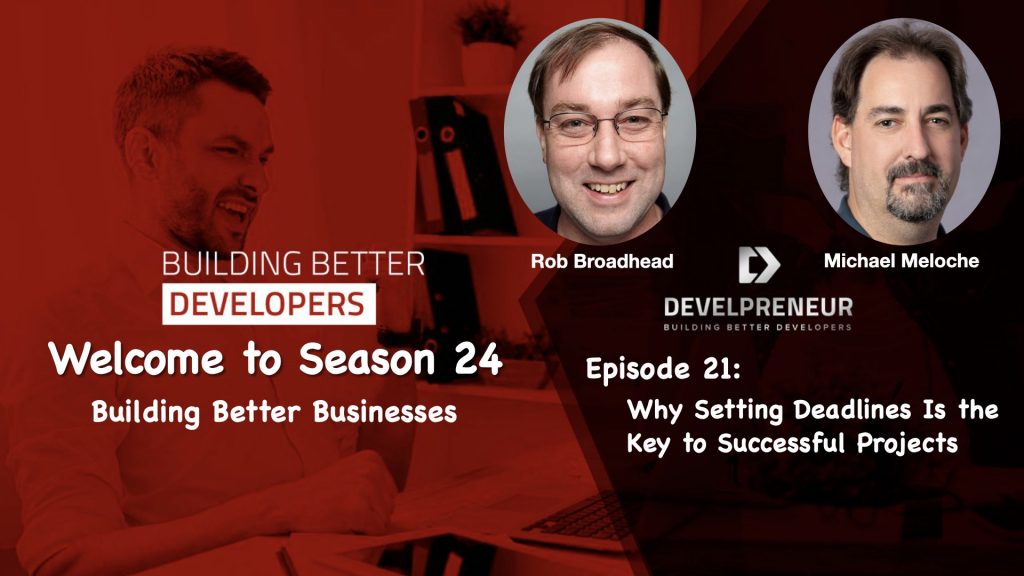In this episode of the Building Better Developers podcast, Rob Broadhead and Michael Meloche dive deep into a critical—but often misunderstood—element of project management: setting deadlines. This episode goes beyond the basics of timelines and introduces the psychology, strategy, and communication needed to make deadlines effective, not stressful.
Why Setting Deadlines Matters for Business Projects
Deadlines define a project’s rhythm. As Rob puts it, “the deadline is the finish line.” It’s not just about when code is complete—it’s about when the product is ready for delivery, after testing, packaging, training, and documentation.
Deadlines force prioritization. Without them, projects risk becoming endless cycles of scope creep and perfectionism. But setting arbitrary or unrealistic deadlines can just as easily derail progress.
🛠️ Pro Tip: Don’t confuse code complete with project complete. Always factor in post-dev steps like UAT, deployment, and training.
The Psychology of the Deadline
Rob shares a story of adjusting clocks in his home to help a chronically late family member—an example of how deadlines are often more psychological than technical.
This translates to project work, where teams may pad estimates or set artificial deadlines to force earlier delivery. Agile frameworks like Scrum embrace this by using time-boxed sprints to create urgency and reduce procrastination.
🧠 Callout: Know your team. Some people thrive under pressure. Others need more space. Tailor your deadlines accordingly.
Waterfall, Agile, or Somewhere In-Between?
Michael discusses the contrast between Waterfall and Agile methods. For new projects, spending more time upfront to define user stories and requirements can create more reliable deadlines. In ongoing projects, Agile’s iterative cycles help manage evolving requirements, but deadlines still matter.
Whether it’s a feature release or a bug fix, every task needs a timeline to stay focused and accountable.
The Pareto Principle in Deadline Planning
Michael invokes the 80/20 rule: aim to deliver 80% of the features on time, with 20% reserved for polish, stretch goals, or unexpected blockers. Build slack into the schedule like airlines do with flight times. Customers are happier when you’re early than when you’re late.
⏳ Did You Know? Airlines improved customer satisfaction by padding schedules—80% of flights now arrive “early.” Apply this mindset to your dev work.
Clear Communication is Non-Negotiable
Both hosts stress that if a deadline needs to move, communicate early and honestly. Clients value transparency over surprises. If you’re late because of scope creep, own it. If it’s your mistake, fix it—even if it means eating the cost.
Your credibility is built not on perfection, but on reliability.
Weekly Challenge: Define “Done”
Rob’s challenge this week is deceptively simple:
- Think of a current project.
- Define what “done” means to you.
- Now, define what “done” means to your customer.
- List the steps required to bridge that gap.
Only then can you set a deadline that truly aligns with expectations.
Final Thoughts
Deadlines are less about time and more about expectation management. From internal planning to external delivery, successful businesses treat deadlines as promises, not guesses.
Set them thoughtfully. Communicate them clearly. Most importantly, deliver on them.
🎯 Takeaway: A well-set deadline isn’t just a timeline—it’s a roadmap to success.
📩 Keep Building Better
Subscribe to the Building Better Developers podcast for more actionable insights on product strategy, technology leadership, and business growth. Do you have feedback or questions? Email the team at [email protected]—they’d love to hear from you!


[…] Why Setting Deadlines Is the Key to Successful Projects […]